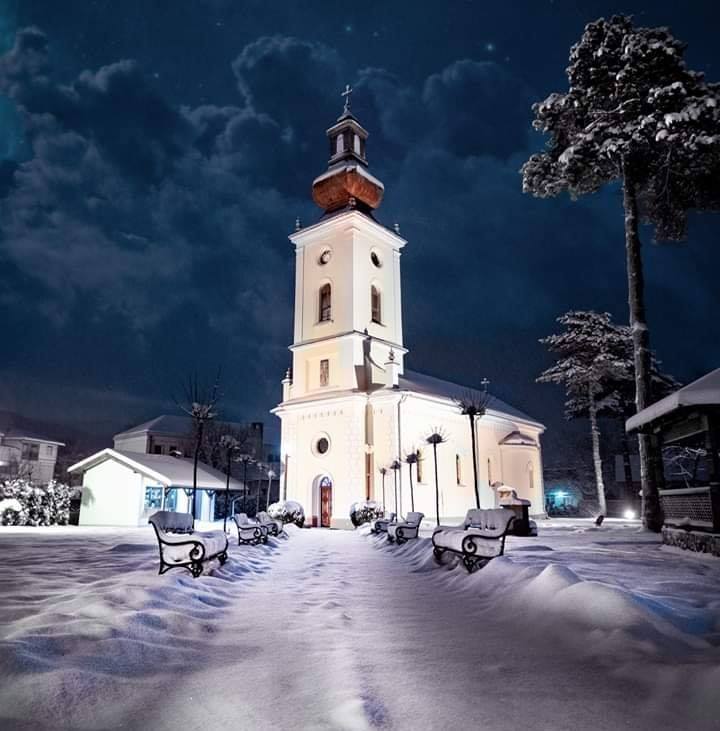[On the Acquisition of the Despotic Dignity and Marriage]
But let us return to the previous matter. The pious Prince Stefan, having arrived in the Reigning City together with his brother Vuk, was greeted with kind words by all, and [e[veryone] thought as if they were looking at a sun. Then he received the despotic dignity from the pious Emperor John. [In Constantinople, August 1402, Byzantine regent John VII Palaiologos granted Stefan Lazarević the high title of despot. Emperor Manuel II Palaiologos confirmed this title in 1410.] For this nephew of his, Emperor Manuel had left in his place, pressed by the previously mentioned Bayezid; he had gone to the Romans of old [Rome] for the union of the church and to raise an army for retribution and deliverance. For many years, the Reigning City had been kept closed because it was perishing from famine. Some fled by night, while the remaining poor were commanded to leave.
Thus, the pious John had not only a few conflicts with the inhabitants of Galata [Genoese]; when he saw [Stefan] in the Imperial City, rejoicing with him in the imperial [courts], he gave [him] a wreath of despotic dignity which he had woven himself through his brave deeds and virtuous endeavours. Emperor John sent him with ships to his father-in-law on the island of Lesbos to escort him to the Albanians. For he intended to go there. And this [father-in-law] undertook [everything] because he had the opportunity to see the bright morning star in his own city; and in this most distinguished and beautiful city of Mytilene, there was no place where this Cateolus did not host him, preparing escorts and feasts in his gardens and orchards with the cry: “Many years, Master,” as is the custom in the ruling order.
Then this most exalted [Stefan], of whom we speak, beheld the daughter of this ruler, whom he later took as his wife. [Stefan married Jelena in 1405, the daughter of Francesco II Gattilusio, lord of Lesbos, a close relative of the Palaiologos dynasty.] For through his mother, she is also a niece to Emperor Manuel, from whom both the lords and that lineage are called Palaiologoi. Then this Gattilusio said to him: “Whichever of my daughters you wish, take her for your wife.” And this occurred with the advice and participation of Empress Jovanova, her sister.
And while the eponymous despot [Stefan] waited on the island for the ships to be prepared, and while he was in them [i.e., the ships] with his brother Vuk, the Greek emperor Manuel came to the western parts towards Gallipoli; there came from the east, after the Battle of Ankara, the eldest son of this lightning-fast one, i.e., Bayezid. There, therefore, this one [Manuel] on the sea [i.e., on a ship], and this one [Suleiman] on land, made a firm friendship, like a father with a son.
Then Thessaloniki returned to the hands of the Greeks. And all the deeds of this Suleiman, the emperor, were good and sensible, only he was defeated more than all other rulers and was never abandoned, so that later he deprived himself of wine and the empire.
Thus, they were joyously with the Greek emperor, worthy of one another.
Thus, the Greek Emperor came to the Reigning City, and [Emperor] John, submitting to him as to a father, withdrew to Thessaloniki; for he was then given control over it. At that time, the Reigning City extended to Vize and further along the Black Sea to the Silivrian side, and the rest, and also along the Achaean sides with the Thessalonian sides and by the Holy Mount Athos. And they also say that many spoke of Kantakouzenos: “Arise and take your state, as a descendant of nobler and more illustrious ancient Greek emperors.” For at that time, instead of a beloved brother, the emperor had left him with John; but he did not want to raise his hands against the blessed Manuel. And thus, the chosen emperor sat on his throne, thanking God for all that had happened, who had led him through fire and water into peace. And thus, there was a great battle at Ankara, in the year 6911 [1403]. [Should be 1402.] And Bayezid’s children held on in the eastern [regions]: Sultan Mehmed in the upper country, who eventually reigned better and more brightly than his brothers; and Musa [fled] to the Tatars, Asebeg to Anatolia, until he was killed by Suleiman. And Mustafa died.



